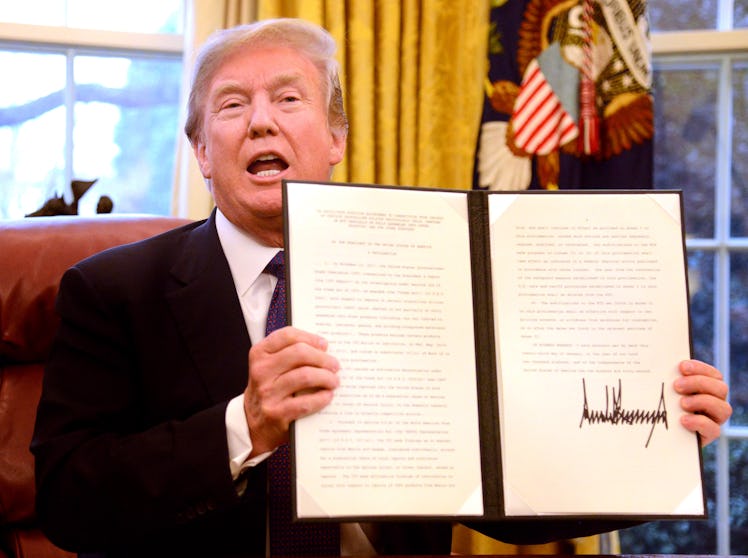
Trump Released A Plan For Dreamers & Nobody's Happy About It
On Wednesday, Jan. 24, President Donald Trump told reporters that he was open to providing a pathway to citizenship for beneficiaries of Deferred Actions for Childhood Arrivals (DACA), the program that protects hundreds of thousands of young, undocumented immigrants from deportation. The following day, the White House went even further, releasing the framework for a plan that would allow citizenship for 1.8 million undocumented "Dreamers," the term used to describe immigrants who arrived to the United States illegally as minors. That expanded path to citizenship is only part of what's in Trump's Dreamers plan, however.
That's because the "Dreamers plan" is a compromise offered to Democrats as part of a larger proposal for comprehensive immigration reform, The Washington Post reported on Thursday, Jan. 25.
What's In The Proposal?
The overall proposal contains four major points.
First, there's the plan for providing a pathway to citizenship for Dreamers. Numerous estimates put the number of undocumented immigrants that applied for, and received, protections under DACA in the range between 600,000 and 800,000 people.
The White House proposal reported on Thursday, however, details a plan that would offer citizenship to at least a million more. That's because the proposal offers the benefit of a pathway to citizenship to dreamers who didn't sign up for DACA as well.
When DACA was established by former President Barack Obama, it essentially required undocumented immigrants to come out of hiding and provide personal information to the federal government. Trump's latest proposal offers a pathway to citizenship — which would, by the way, take up to 12 years to fulfill — to Dreamers who didn't even have DACA protections to begin with.
What The Trump Administration Wants In Return
The White House's overall immigration plan would seek to secure a number of measures from Congress, in addition to the pathway to citizenship. The president would be seeking $25 billion in a "trust fund" for a border wall and extra security along both the southern and northern U.S. borders, The Washington Post reports.
Trump would also seek to limit what he calls "chain migration." The term has been used by Republicans to describe the process by which green card holders and naturalized citizens in the U.S. sponsor the immigration of family members abroad. The White House plan reported on Thursday aims to limit the practice to allow only sponsorship for the nuclear family — spouses and young children.
Lastly, the White House is aiming to reallocate the visa awards from the "diversity lottery" program — which results in about 50,000 visa to for foreigners annually — and instead award them to people who are part of the list of nearly 4 million who are seeking green cards.
Why Democrats And Republicans Oppose It
Despite the fact that the White House proposal offers a pathway to citizenship for more dreamers than the amount that DACA originally protected, Democratic leaders swiftly voiced their opposition to the plan.
In a statement, House Minority Leader Nancy Pelosi (D-CA) argued that the plan would ultimately result in significant cuts in legal immigration, going as far to say President Trump wants to "make America white again."
"The 50 percent cut to legal immigration in the framework and the recent announcements to end Temporary Protected Status for Central Americans and Haitians are both part of the same cruel agenda," the statement read. "They are part of the Trump Administration’s unmistakable campaign to make America white again."
On the other side of the aisle, there are notable immigration hardliners like Senator Tom Cotton (R-AK) who endorse the White House proposal, but there are also reports that House Republicans are unhappy with the plan.
With the plan far from a slam dunk with Trump's own party (for now, at least), the fate of the White House's proposal might rest on how hard the president promotes the deal in Washington D.C. going forward.